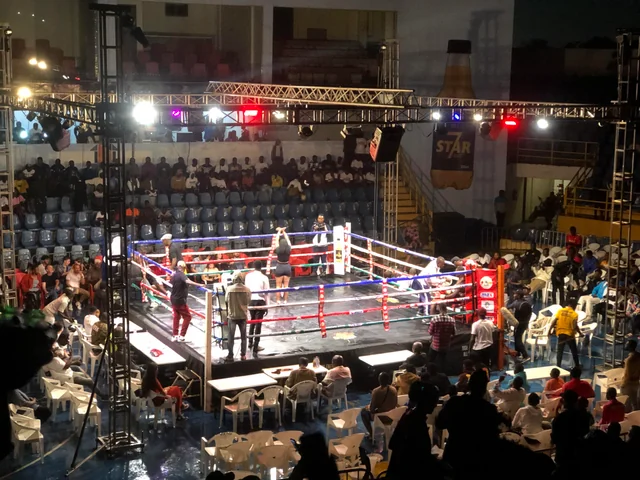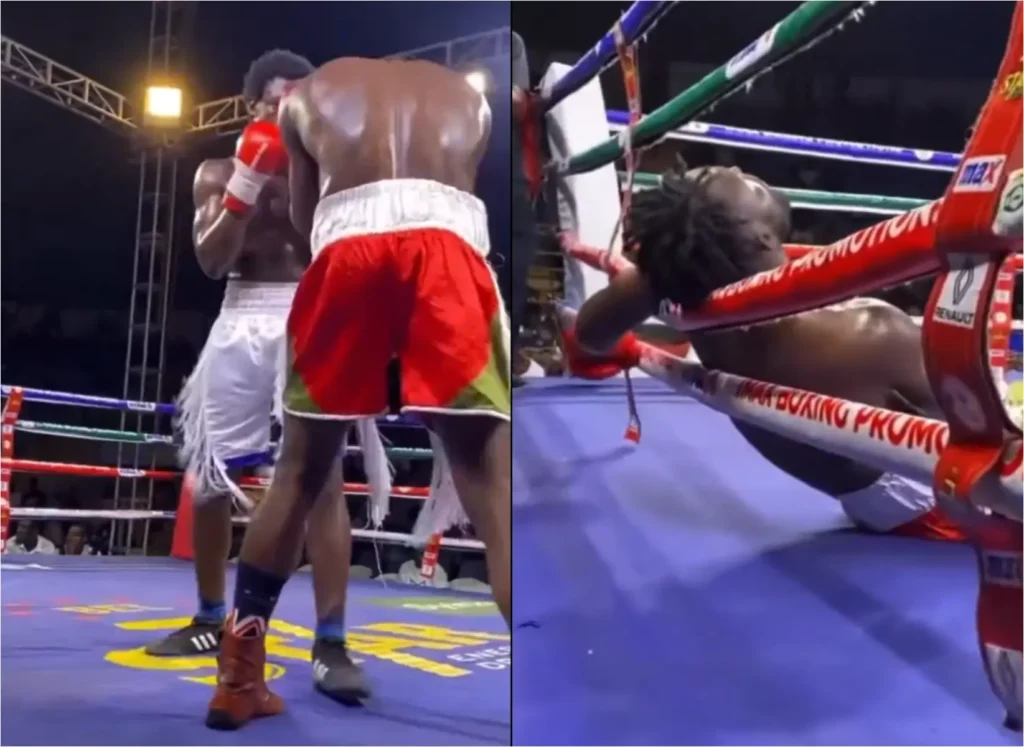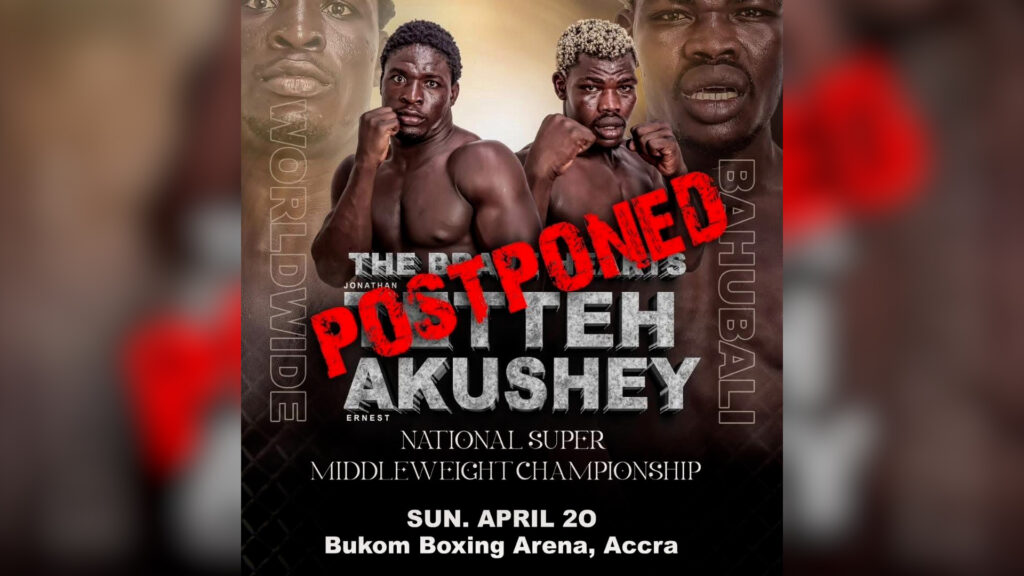By Peter Quao Adattor

The tragic death of Nigerian light heavyweight boxer Gabriel Aluwasegun Olanrewaju, popularly known as “Success,” during an international bout at the Bukom Boxing Arena on Saturday, March 29, has cast a long shadow over Ghana’s boxing landscape. The 40-year-old fighter collapsed in the third round of his scheduled eight-round contest against Ghanaian opponent Jonathan Mbanugu, during Match Night 15 of the Bel 7Star Ghana Professional Boxing League. He was later pronounced dead. A subsequent pathology report revealed the cause of death as cardiac arrest.
A Wake-Up Call for the Sport
In an article published on April 4, I analysed the tragedy as a wake-up call for Ghana’s boxing fraternity and broader sports governance institutions. The piece addressed how a lack of adherence to internationally recognised medical protocols may have contributed to the unfortunate incident, a scenario that underscores the need for urgent reforms in Ghana’s boxing ecosystem.
Globally, boxing is governed by strict ethical and medical standards designed to safeguard fighters before, during, and after bouts. These are enforced by organisations such as the World Boxing Council (WBC), World Boxing Association (WBA), International Boxing Federation (IBF), World Boxing Organisation (WBO), and various national boxing commissions. Unfortunately, our systems in Ghana have too often failed to mirror these standards.
What Standard Practice Looks Like
Medical evaluation protocols in professional boxing follow a three-phase model:
- Pre-Contract Medical Evaluations: These are carried out before any bout is confirmed. If a boxer fails at this stage, the fight contract is not signed.
- Training Camp & Pre-Fight Medicals: Continuous assessments are conducted throughout the training period. These include cardiovascular screening, bloodwork, neurological tests, and more.
- Fight Week & Fight Night Protocols: During fight week, boxers undergo final medical checks, including weight management assessments, hydration status, and heart and brain evaluations. On fight night, medical personnel must be on standby ringside, equipped for emergency response, including a thorough examination of a boxer who has suffered a severe knockout.
If a boxer fails any stage of this rigorous process, the fighter is either withdrawn from the card or, in high-profile bouts, the entire event may be postponed.
The Road Ahead
Gabriel Olanrewaju’s passing should serve as more than just a moment of mourning, it must be a turning point. Ghana must now commit to a systemic overhaul of its boxing safety protocols. This includes mandatory compliance with international medical standards, better pre-fight screening, and the licensing of only facilities and promoters who can guarantee the health and safety of fighters.
One tragedy is one too many. The question now is whether the stakeholders, regulators, promoters, trainers, and health professionals are ready to act before history repeats itself.

Rethinking Medical Protocols in Ghanaian Boxing
Following a thorough analysis of the prevailing conditions and practices within Ghana and across Africa, this article calls for urgent and uncompromising adherence to medical and safety standards in boxing. The tragic death of Nigerian boxer Gabriel Olanrewaju on March 29 is a sobering reminder of boxing’s inherent dangers, where head trauma, physical exhaustion, and undetected health conditions can lead to fatal outcomes.
While it is believed that Olanrewaju’s death was caused by cardiac arrest, the incident underscores a larger issue: the inconsistencies and gaps in pre-fight medical protocols. In Ghana and much of Africa, fighters are often not subjected to comprehensive health assessments. Routine procedures such as neurological and cardiovascular evaluations, physical fitness checks, and drug testing for banned substances are either inconsistently applied or absent.

Call to Action
This tragedy should serve as a turning point. It is now imperative for government agencies, the Ghana Boxing Authority (GBA), promoters, trainers, and medical professionals to elevate their commitment to fighter safety. Boxers must not be allowed to step into the ring without the highest level of medical clearance and assurance.
Key recommendations for reform include:
- Training & specialisation of sports doctors, particularly in combat sports medicine.
- Establishment of a dedicated Sports Medicine Unit within the GBA or the Ministry of Youth and Sports.
- Mandatory advanced medical screening before a fight contract is approved.
- Enhanced ringside medical readiness, with fully equipped personnel and ambulances.
- Tighter regulation of matchmaking and fighter selection, ensuring fairness and physical parity.
A Prompt and Positive Response
Remarkably, just a day after this call to action gained national traction, the Ghana Boxing Authority issued a firm directive titled “Submission of Fight Contracts Two Weeks Ahead of Fight Nights.” The directive mandates that all fight contracts and match pairings be submitted well in advance, clearly signalling that the era of business-as-usual is over. The message was direct: Ghana’s boxing landscape must change, and the GBA is ready to lead that charge.
If the right lessons are taken from this tragedy, then Gabriel Olanrewaju’s untimely death will not be in vain. It could be the catalyst that finally compels the industry to put fighter safety before spectacle.
From Tragedy to Transformation: GBA Acts After Boxing Death
Though a quick read of the Ghana Boxing Authority’s (GBA) initial directive may reveal it lacked some of the technical depth expected in a professional regulatory framework, it nonetheless signals a critical shift in attitude. As the adage goes, “a journey of a thousand miles begins with a single step”, and even a late start is better than no action at all.
Killing Two Birds with One Stone
The GBA’s first circular following the tragic March 29 boxing fatality was more than just a call for adherence to mandatory medical standards. It also tackled one of the most persistent irregularities in Ghanaian boxing, the last-minute inclusion of unprepared or unvetted fighters onto match cards.
In a firm tone, the GBA declared that “no fights will be allowed to be added to the already submitted fight pairings on the day of weigh-in and medical check-ups.” Only bout contracts submitted within the stipulated deadline will be permitted. This move, although long overdue, is a welcome step toward restoring discipline and professionalism in match preparations.
Action No. 2: “We Mean Business”
Ten days later, the GBA followed up with a second circular, this time, more detailed and deliberate. The Authority outlined a checklist of strict compliance requirements for promoters and stakeholders before any fight night can be approved. These include:
- License copies of all boxers scheduled to fight
- Full payment of official GBA fees
- Submission of verifiable medical reports, including a signed “fit to box” certificate
- Proof of purse payments for each boxer
Additionally, in a progressive step to bolster ringside safety, the GBA announced arrangements for mandatory ECG (electrocardiogram) screenings on weigh-in day. Promoters are expected to bear the cost of ¢600.00 per boxer for this service.
A Glimmer of Reform
These actions, though reactive, reflect a newfound commitment by the GBA to put boxer safety and regulatory compliance at the heart of Ghana’s boxing revival. They are a response not only to public outcry following the death of Gabriel Olanrewaju, but also to decades of lax oversight in the sport.
While there is still a long way to go, the GBA’s recent moves provide a glimmer of hope that Ghana’s boxing authorities are finally prepared to move beyond rhetoric and into meaningful, enforceable reform. If sustained, these steps could reshape the sport’s future, making Ghana a respected model for safety, professionalism, and integrity in African boxing.
GBA Releases Comprehensive Medical Protocols Ahead of Fight Nights
New mandatory health regulations & timeline.
In a decisive step to raise medical standards in Ghanaian boxing, the Ghana Boxing Authority (GBA) has released a detailed circular titled “Mandatory Pre-Fight Medical Examinations and Timeline, Upcoming Sanctioned Bouts.” The directive, issued six days after earlier reforms, outlines critical health screening protocols and timelines that must be adhered to before any fight night is approved.
Signed by Dr. Eric Tetteh Ayertey, a designated GBA Medical Doctor, the two-and-a-half-page document underscores the Authority’s “unwavering commitment to upholding the highest standards of health and safety for all athletes.” It sets forth clear medical requirements and cost implications, warning stakeholders that non-compliance could lead to disqualification or removal from scheduled bouts.
Comprehensive Medical Screening Protocols
1. Annual/Baseline Medical Clearance to be completed at least 7 days before the bout
| Test | Estimated Cost (¢) | Validity |
| Ophthalmologic (Retinal) Examination | 250.00 | 3–6 months |
| Brain Imaging (CT/MRI) | 500.00–1,000.00 | 1–3 years |
| Urinalysis | 123.00 | 1–3 months |
| Pregnancy Test (Females only) | 30.00–50.00 | 7 days before the bout |
| Medical Certificate Issuance | 100.00 | Current competitive year |
| Total Estimated Cost: | 1,003.00+ | Depending on the case base |
2. Mandatory Pre-Bout Physical Medical, to be conducted 24–36 hours before the fight, usually on weigh-in day
| Test | Estimated Cost (¢) | Validity/Timing |
| ECG (12-lead resting) | 200.00 | 3 months |
| Full Blood Count (FBC) | 123.00 | 7–10 days before the fight |
| Hepatitis B/C, HIV Test | 313.00 | 3 months |
| Vitals (BP, HR, Temp, Weight) | 20.00 | 24 hrs before the fight |
| Neurological & Physical Exam | 80.00 | 24 hrs before the fight |
| ENT & General Inspection | 140.00 | 24 hrs before the fight |
| Medical Certificate | 100.00 | On weigh-in day (1-year validity) |
| Total Estimated Cost: | 986.00 | Per boxer |
Execution and Enforcement
Medical tests must be conducted at GBA-accredited centres, namely Accident & Emergency Labsand The Central Lab at Korle Bu Teaching Hospital. Final reports are to be submitted to the GBA Medical Directorate no later than 48 hours before the fight. The directive makes it clear: failure to meet these timelines will lead to automatic disqualification of the boxer from the event.
This updated policy not only signals a historic turning point for Ghanaian boxing but also affirms the GBA’s resolve to ensure that every fighter enters the ring with a clean bill of health, reducing the risk of preventable tragedies in future sanctioned bouts.
The Price of Safety: Financial Implications of New Medical Standards
Implementing stricter medical protocols in Ghana boxing has come at a cost, literally. A rough estimate of the expenses involved in meeting the newly announced Ghana Boxing Authority (GBA) health requirements pegs the total at 2,589 cedis (approximately USD 182) per boxer. This figure, although still short of the comprehensive international standards discussed in my earlier article, has already sparked considerable anxiety across the boxing community.
For many boxers, trainers, and promoters operating in an underfunded sport with minimal sponsorship and low public turnout, this new financial burden threatens participation. While the GBA’s directive is a step in the right direction for safeguarding lives in the ring, the economic implications risk sidelining aspiring talents due to a lack of systemic support.
The Financial Impact of Ghana Boxing Authority’s New Medical Directive
The unintended consequences have already begun to manifest. Two sanctioned fight nights in April were disrupted. The first was the Box Office Sports Promotion bill slated for Sunday, April 20. Just three days prior, it was postponed due to a minor injury to one of the headliners. In a notable departure from past practice, where such setbacks would often be concealed until post-fight analyses, the affected boxer urged promoter Alex Ntiamoah Boakye to reschedule. The fight has since been moved to May 10.

The second event, hosted by Nana’s Promotions on Friday, April 25, went ahead but not without drama. Spectators endured a four-hour delay as the GBA board insisted on full compliance with the new protocols. According to ring announcer Mohammed Amin Lamptey, the Authority refused to compromise on the thorough medical vetting. Of six originally scheduled bouts, only five made it to the ring.
While reactions have varied, one thing is clear: Ghana must never again witness a preventable tragedy like the March 29 incident that took the life of Nigerian boxer Gabriel Olanrewaju, simply because critical protocols were overlooked. The GBA deserves credit for standing firm, but the responsibility must now be shared.
The government, particularly the Ministry of Youth and Sports, must act urgently to support this reform. This includes funding for medical screenings, specialist training in sports medicine, and infrastructure development to meet international safety standards.
Ghana boxing is at a crossroads. We can either invest in a safer, sustainable future or continue to gamble with lives in the name of sport.
By Peter Quao Adattor








